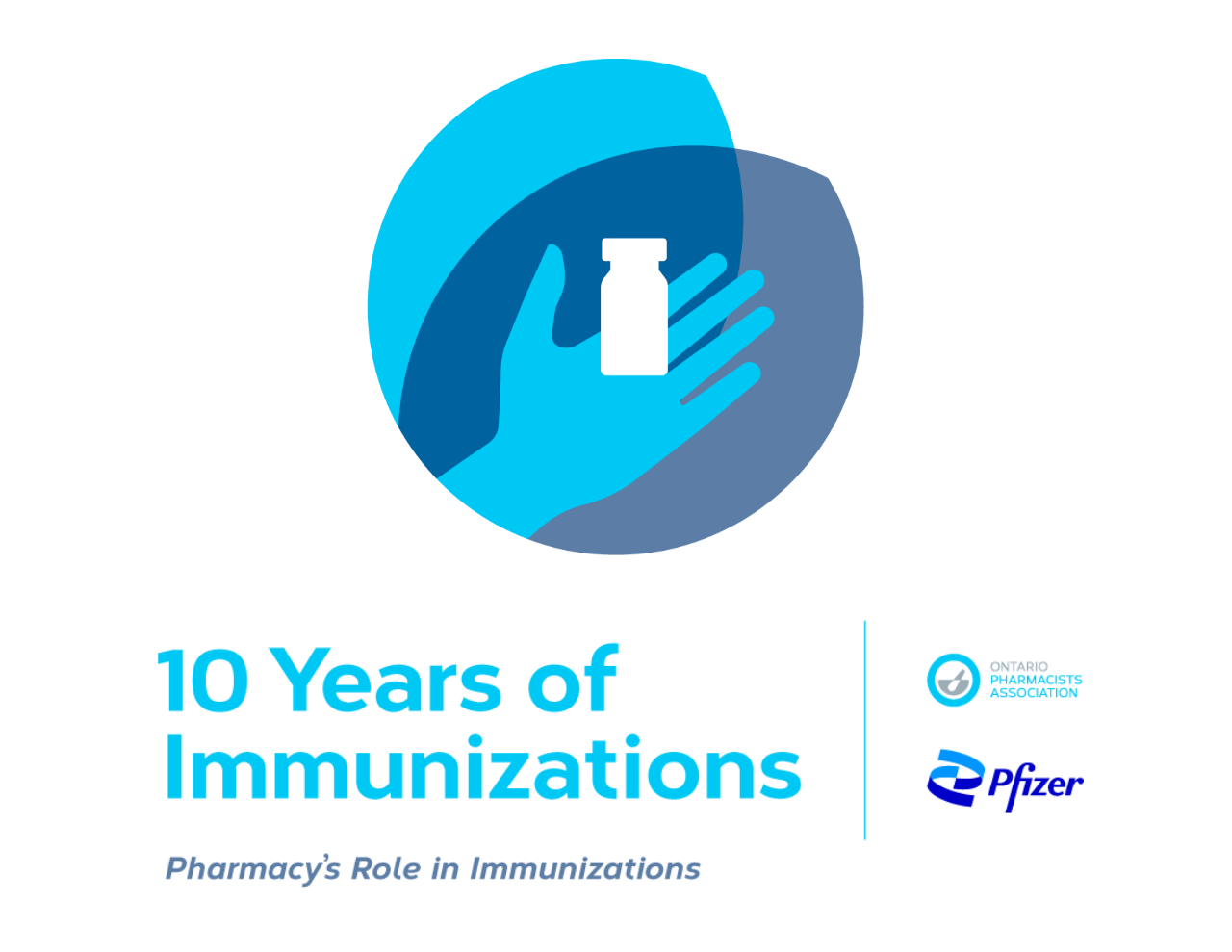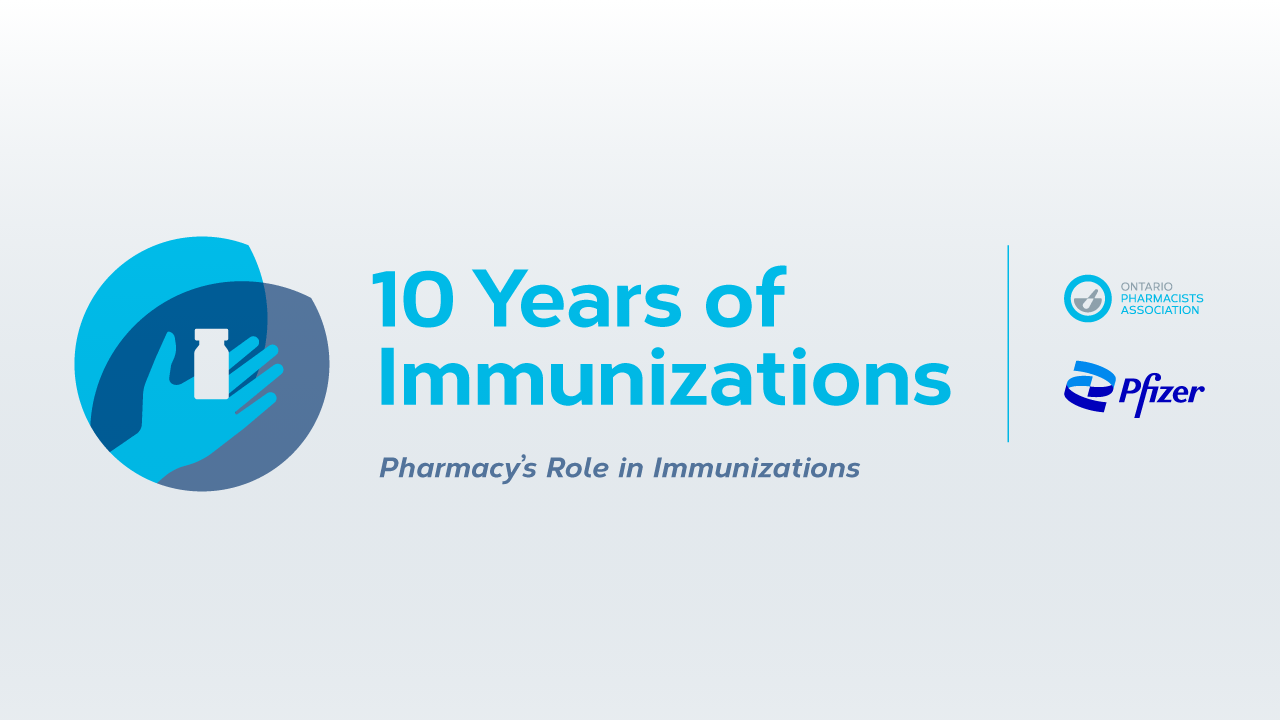
10 Years of Immunizations is a signature learning series, supported through an education grant from Pfizer Canada.
Preventing an estimated 2.5 million deaths annually worldwide, vaccines are considered one of the most significant public health achievements.1
Preventing an estimated 2.5 million deaths annually worldwide, vaccines are considered one of the most significant public health achievements.1

Numerous common infectious diseases that were once a major cause of morbidity and mortality in Canada are now preventable due to vaccines.2 To support and enhance population health, it is important to ensure that patients have convenient and equitable access to immunization services. Increasing vaccine uptake and helping patients easily access integral vaccine administration services requires a collaborative approach from health care professionals from all practices. Over the last decade, pharmacy professionals have developed a more prominent role in supporting and boosting vaccine uptake. As accessible health care providers and patient advocates, pharmacy professionals’ unique expertise and relationship with patients can be leveraged to increase immunizations and public awareness.

Throughout the COVID-19 pandemic, pharmacies have provided patients with expanded access to vaccine services. The shifting role of pharmacy professionals as immunizers has transformed the public’s perception of the profession and strengthened relationships with patients. Approximately 95% of Canadians live within five kilometres of a community pharmacy.3
Access to convenient healthcare is especially important for high-risk populations or in regions with less access to other health care providers. Pharmacy professionals have proven themselves to be effective advocates, educators, and administrators of vaccines and have enhanced vaccine uptake in their communities through quality care and access. As demonstrated by the pandemic and over the last ten years, there is a tremendous opportunity to increase immunization programs through pharmacies.
Discover a brief history and evolution of pharmacy professionals’ role in supporting immunization efforts in Ontario over the last ten years.
Discover a brief history and evolution of pharmacy professionals’ role in supporting immunization efforts in Ontario over the last ten years.
Did you know?
The word vaccine is derived from the Latin word vaccinia (meaning cowpox virus), which comes from the Latin word vacca (meaning cow).4 Vaccines originated from a technique devised by Edward Jenner in 1796, where he scraped the scabs from cowpox lesions on a milkmaid’s hand into a cut on a young boy’s skin, which resulted in the boy’s immunity to smallpox.5 In 1798, the first smallpox vaccine was created.
10 Years of Immunizations Timeline
10 Years of Immunizations Timeline

October
2012
For the first time in Ontario, injection-trained pharmacists are permitted to administer publicly funded influenza vaccines within the community pharmacy-based Universal Influenza Immunization Program (UIIP) to patients 5 years of age and older.
December
2016
Pharmacists’ scope of practice in Ontario is expanded to enable administration of vaccines for 13 vaccine-preventable diseases to any patient 5 years of age or older. Authority includes vaccinations for:
1. Bacille Calmette-Guérin (BCG)
2. Haemophilus influenzae type b (Hib)
3. Hepatitis A
4. Hepatitis B
5. Herpes Zoster (Shingles)
6. Human Papillomavirus (HPV)
7. Japanese Encephalitis
8. Meningococcal disease
9. Pneumococcal disease
10. Rabies
11. Typhoid
12. Varicella
13. Yellow Fever
The authority to administer the influenza vaccine in accordance with the UIIP is extended to pharmacy students and interns.
2018
During the 2017/2018 UIIP season 1,198,187 doses of influenza vaccines are administered through 2,902 Ontario pharmacies.
August
2020
Announcement of the inclusion of high-dose influenza vaccine for seniors age 65+ in the pharmacy-based UIIP program for the 2020-2021 influenza season.
September
2020
Amendments to the pharmacy UIIP User Agreement allow for registered pharmacies to administer influenza vaccines outside of a pharmacy’s premises.
December
2020
Injection-trained pharmacists, pharmacy interns and pharmacy students participating in the UIIP are permitted to administer flu vaccines to patients 2 years of age and older.
Pfizer and BioNTech receives the world’s first temporary authorization in the U.K. for the coronavirus vaccine, BNT162b.
Health Canada authorizes the Pfizer-BioNTech COVID-19 vaccines for individuals 16 years of age and older.
The Moderna (Spikevax) COVID-19 vaccine is the second authorized mRNA vaccine in Canada for adults 18+.
February
2021
The AstraZenca (Covishield) COVID-19 vaccine is authorized for adults 18 years of age and older, this is the first viral vector-based COVID-19 vaccine permitted in Canada.
March
2021
Part A pharmacists, registered pharmacy students, interns and pharmacy technicians in Ontario who have completed the required injection training are authorized to administer publicly funded injectable COVID-19 vaccines at participating pharmacies. This increase in scope of practice marks the first time pharmacy technicians are able to provide vaccines.
May
2021
The Comirnaty Vaccine (Pfizer-BioNTech) is authorized to be administered to children and youth 12 to 17 years of age.
June
2021
Ontario pharmacies reach a milestone of 1 million doses of COVID-19 vaccines administered.
July
2021
Ontario pharmacies reach a milestone of 3 million doses of COVID-19 vaccines administered.
November
2021
Pharmacies begin to provide the Pfizer pediatric COVID-19 vaccine to children aged 5-11.
Providing Ontarians with more options for care and helping to ease the burden on pharmacies, injection-trained pharmacy technicians are authorized to administer influenza vaccines to patients 2 years of age and older in accordance with Ontario’s UIIP.
Health Canada authorizes the use of the Pfizer-BioNTech Comirnaty and Moderna Spikevax vaccines as booster shots for adults 18 years of age and older.
The Janssen (Johnson & Johnson) COVID-19 vaccine is authorized as a 1-shot primary series vaccine for individuals 18 years of age and older.
December
2021
A record of 1.8 million+ doses of influenza vaccines are administered through 3,220 Ontario pharmacies for the 2020/2021 UIIP season. This is the highest number of influenza vaccines administered since the inception of the pharmacy-based influenza immunization program.
5 million doses of COVID-19 vaccines are administered through Ontario pharmacies.
In response to the Omicron variant, pharmacies are permitted to administer COVID-19 vaccines at off-site mobile clinics in collaboration with their local public health unit (PHU).
February
2022
Ontario youth between the ages of 12 and 17 are eligible to receive a booster dose of the COVID-19 vaccine.
Over 7 million doses of COVID-19 vaccines are administered through Ontario pharmacies.
The Medicago Covifenz COVID-19 Vaccine is authorized for individuals 18 to 64 years of age and older. Covifenz is the first plant-based virus-like particle vaccine authorized for use in Canada.
Novavax’s Nuvaxovid COVID-19, a protein-based vaccine is authorized for individuals 18 years of age and older.
March
2022
The Moderna Spikevax COVID-19 vaccine (50 mcg) is authorized for children 6 to 11 years of age. This is the second COVID-19 vaccine authorized in Canada for use in a younger age group.
Over 7.5 million doses of COVID-19 vaccines are administered through Ontario pharmacies.
Did you know?

Although pharmacy professionals’ role in vaccinations has grown substantially and shifted the patient-provider relationship there is still room to build on this last decade of success. Currently, there are two publicly funded vaccines that Ontario pharmacies provide to patients: COVID-19 and influenza vaccines. However, injection-trained pharmacists can administer 13 additional vaccines outside of the publicly funded program. Providing pharmacy professionals with education and support can result into significant growth in vaccination rates in these vaccine preventable disease categories. The Ontario Pharmacists Association (OPA) has a long history of advocating for the increased role of pharmacy teams as vaccinators and extending public health vaccination programs in pharmacies. Over the last two years, the majority of public focus has been on COVID-19 vaccines, which can lead to patients forgetting or letting other immunizations fall by the wayside. There is a major future potential for educating patients on the importance of immunizations for vaccine-preventable diseases and increasing immunization targets. Pharmacy professionals are in a prime position to identify patients who may need certain vaccinations and provide patients with key information to make informed decisions while addressing vaccine hesitancy. Pharmacy teams have consistently demonstrated that they can safely and effectively administer vaccines and manage adverse drug reactions and there is a tremendous future opportunity to leverage them to help reach target immunization rates in Ontario.
Resources
Resources
About 10 Years of Immunizations
The Ontario Pharmacists Association (OPA) in partnership with Pfizer Canada, has launched 10 Years of Immunizations, an initiative that highlights pharmacy professionals’ role in advocating and administering immunizations over the last decade. Including live webinars and resources for pharmacy professionals, 10 Years of Immunizations also aims to raise awareness about the importance of accessibility to immunizations.
References:
- Terrie, Yvette C. “The Role of the Pharmacist in Overcoming Vaccine Hesitancy.” U.S. Pharmacist – The Leading Journal in Pharmacy, 16 Apr. 2021, https://www.uspharmacist.com/article/the-role-of-the-pharmacist-in-overcoming-vaccine-hesitancy.
- Public Health Agency of Canada. “Vaccine Preventable Disease: Surveillance Report to December 31, 2017.” 16 Apr. 2020, https://www.canada.ca/en/public-health/services/publications/vaccines-immunization/vaccine-preventable-disease-surveillance-report-december-31-2017.html.
- McGillivray, Kate. “Ontario Should Allow More Routine Vaccinations at Pharmacies, Says Pharmacy Association.” CBC News, 24 Oct. 2021, https://www.cbc.ca/news/canada/toronto/ontario-vaccinations-pharmacies-record-keeping-1.6222473.
- Turley, Patrick K. “Vaccine: From vacca, a cow.” AJO-DO Clinical Companion, vol.1, no. 1, 21 June. 2021, https://www.ncbi.nlm.nih.gov/pmc/articles/PMC8216846/.
- 5. “History of Smallpox.” Centers for Disease Control and Prevention, 20 Feb. 2021, https://www.cdc.gov/smallpox/history/history.html.
- “Vaccine Uptake in Canadian Adults: Highlights from the 2020-2021 Seasonal Influenza Vaccination Coverage Survey.” Government of Canada, 2 Nov. 2021, https://www.canada.ca/en/public-health/services/immunization-vaccines/vaccination-coverage/highlights-2020-2021-seasonal-influenza-survey.html.





